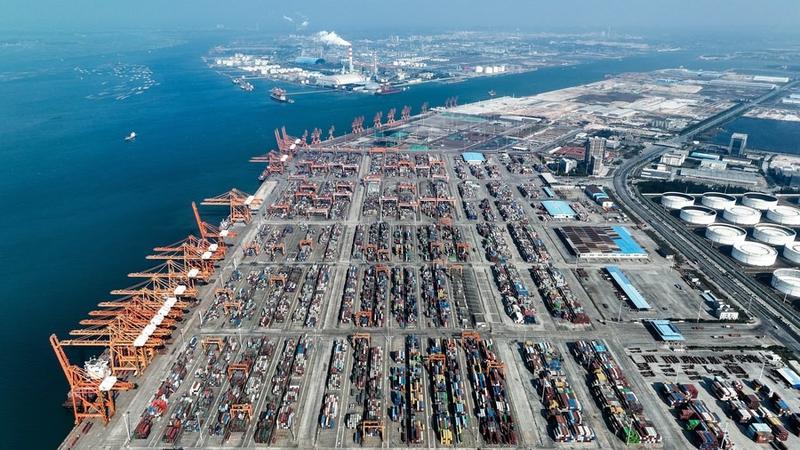 This aerial photo taken on Feb 25, 2023 shows the container terminal at Qinzhou Port in south China's Guangxi Zhuang autonomous region. (PHOTO / XINHUA)
This aerial photo taken on Feb 25, 2023 shows the container terminal at Qinzhou Port in south China's Guangxi Zhuang autonomous region. (PHOTO / XINHUA)
BEIJING - The Chinese economy will continue to serve as an engine of growth and contribute to global economic recovery, while the United States' reckless fiscal and monetary policies have spread its inflation to other parts of the world and seriously held back the recovery, a Chinese foreign ministry spokesperson said on Thursday.
The latest reports issued by the World Bank and the Organization for Economic Cooperation and Development (OECD) both noted that China's reopening will provide impetus for world economic growth. The World Bank predicted that China's economy will grow by 5.6 percent in 2023 and the OECD set this figure at 5.4 percent.
According to a recent report by the China Council for the Promotion of International Trade, 97 percent of the surveyed foreign companies rated China's foreign investment policy since the fourth quarter of last year "satisfied" or above
Spokesperson Wang Wenbin said that several international organizations and institutions such as the United Nations, the World Bank and the International Monetary Fund have recently raised their forecast for China's growth. Some of them even revised up the forecast more than once.
"It shows their confidence in China's economic prospect. The Chinese economy will continue to serve as an engine of growth and contribute to global economic recovery," he said.
"We have also seen senior executives of many transnational corporations coming to China recently, which is also a vote of confidence for China's economy," he added.
ALSO READ: Recovery to propel oil, gas consumption
Foreign businesses value the enormous opportunities brought by China's robust economic recovery and consider the improving business environment here a favorable sign. They are upbeat about the Chinese market and ready to invest in all aspects in China, Wang said.
According to a recent report by the China Council for the Promotion of International Trade, 97 percent of the surveyed foreign companies rated China's foreign investment policy since the fourth quarter of last year "satisfied" or above. The satisfaction rate in terms of accessing financial services and market access exceeded 80 percent, Wang noted.
 This undated photo shows a view of Lujiazui area, the financial center in Shanghai. (ZHANG HAIBIN / FOR CHINA DAILY)
This undated photo shows a view of Lujiazui area, the financial center in Shanghai. (ZHANG HAIBIN / FOR CHINA DAILY)
A report issued by the EU Chamber of Commerce in China indicates that the size of China's market, strong demand, the fast pace of commercialization of R&D results and ample local talents steer a large share of European companies towards deeper localization, and close to 60 percent of the companies surveyed said that they would increase R&D expenditure in China in the coming five years, according to the spokesperson.
According to the Global Debt Monitor issued by the Institute of International Finance recently, the global debt stock has hit $305 trillion, $45 trillion higher than before the COVID-19 pandemic. The US has the world's highest national debt, which stands at $31.4 trillion
An AmCham China survey shows that 66 percent of US companies in China will maintain or increase investment in China in the coming two years, he added.
ALSO READ: WB official's insight into China's growth, resilience, greenness
China will remain firmly committed to advancing high-level opening up and providing a more market-oriented, law-based and world-class business environment for companies of all countries, Wang said.
"We welcome more foreign companies to invest in China, explore the Chinese market and share in China's development dividends," the spokesperson added.
Dollar hegemony
According to the Global Debt Monitor issued by the Institute of International Finance recently, the global debt stock has hit $305 trillion, $45 trillion higher than before the COVID-19 pandemic. The US has the world's highest national debt, which stands at $31.4 trillion, raising further concerns about US government spending and borrowing costs.
In response to the report, Wang said the US is the world's largest economy and issuer of a major international currency. It should have adopted responsible fiscal and monetary policies given the heavy spillover effect of its fiscal conditions and policy choices on the world economy.
ALSO READ: Dollar decline driven by US weaponization
"However, the US has long used its dollar hegemony, borrowed recklessly, shifted crises, and pursued quantitative easing which knows no limit," he said, noting that this has spread US inflation to other parts of the world, made debt problem and economic woes in some emerging economies and developing countries even worse and seriously held back global recovery.
"The dollar is our currency, but it is your problem," the spokesperson quoted John Connally, the Treasury Secretary of the Nixon administration, to criticize the hazard of dollar hegemony.
"We urge the US to opt for responsible fiscal and monetary policies, and work with other economies to enhance macroeconomic policy coordination, jointly safeguard international economic and financial stability and contribute to global recovery," Wang said.


